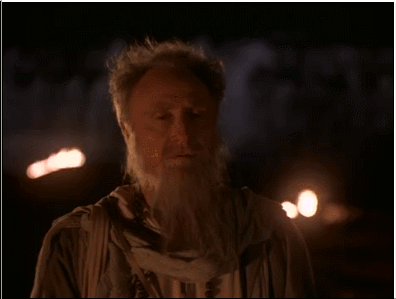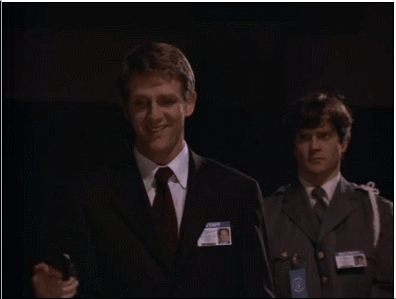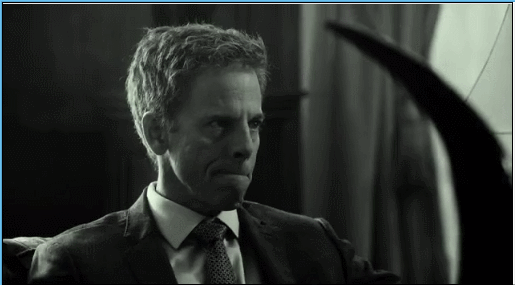Folks, it is time to revive the old blog again because Netflix has released their first (relatively) adult-oriented interactive film, Black Mirror: Bandersnatch. As someone who writes narrative-focused games with branching narratives, I’d be remiss to completely ignore Bandersnatch and as someone who wants to promote himself (however reluctantly) I’d be stupid not to weigh in on a moment of cultural zeitgeist.
If you don’t know what Bandersnatch is and care about spoilers, I’d recommend that you stop reading this post. I’m gonna spoil the shit out of Bandersnatch. If you care, go watch/play it before you read any further.
If you don’t know what Bandersnatch is and don’t care about spoilers, Bandersnatch is an interactive film produced by the creators of the Channel 4/Netflix series Black Mirror. Black Mirror is, in turn, an anthology TV series exploring the intersection of modern society and modern technology. The story of Bandersnatch changes based on decisions made by the viewer. The viewer chooses whether the main character, Stefan, eats frosted flakes for breakfast. The viewer also chooses whether Stefan murders his father. Yep.
Along with my partner, I write video games that are typically classified as visual novels (though, due to certain biases, we often call them adventure games). Bandersnatch,at its heart, shares a lot of DNA with visual novels. Specifically, the participation of the reader/player/viewer is limited to occasional choices that affect the development of the plot. That is how the viewer/player interacts with the work and affects its storytelling. You could call it an “interactive movie” or FMV game or get everyone angry with you by asking whether it is a movie or a game, but I approached it like I would a VN. Because that’s what I do.
Another way of looking at it: I often remark that Woodsy Studio makes indie Telltale games; which is to say that we strive to achieve similar (branching) storytelling but with a team of literally two people and very little budget. Bandersnatch is the opposite. It is like a Telltale game made with even more people, with actual actors and millions of dollars of production. And, for better or worse, it is going to be the first time a lot of people experience a branching narrative production.
So I had to write something.
HERE’S WHAT I LIKED:
First: The best part of Bandersnatch is the book. For those who haven’t seen/played it, the story of Bandersnatch focuses on a young game developer in 1984 who is adapting a book (called, of course, Bandersnatch) into a game. The game he is making is effectively an indie visual novel. The book is a “choose your own adventure” novel. But it’s not like any real “choose your own adventure” novel, because it is a (relatively) critically-acclaimed piece of outsider art written by a troubled artist plagued with mental illness. People respect it. People revere it as a novel of meaning.
Bandersnatch (the Netflix interactive film) starts by positing that Bandersnatch (the Choose Your Own Adventure book) could be art. This was really important to me, because interactive fiction games/visual novels are often denigrated with a comparison to those very same books. Writing interactive fiction would be SO MUCH BETTER if there was a massive critically-acclaimed fantasy CYOA book from the 1970s that we could all use as a touchstone but we’re not that lucky.
The metatextual treatment of Bandersnatch (the book) in the film was kind of a lame rip-off of the metatextual stuff in House of Leaves, but holy cow it was nice to see an alternative reality in which a “choose your own adventure” book was treated with any amount of reverence.
Second: The joke ending was great. Maybe my biggest regret was that literally the first ending we watched was the one where the viewer/player reveals themselves as a Netflix member. The main character, Stefan, relays this to his therapist who goes on to posit the very reasonable question: if we are TV characters, why aren’t we doing anything more interesting?
When you agree with this (by selecting FUCK YEAH) from the menu, Bandersnatch turns into a very brief Edgar Wright-esque action comedy. The therapist dual wields batons. Stefan’s father intervenes, Terminator-like, and the way to disable him is to choose to kick him in the balls.
It’s incredibly dumb. It’s incredibly fourth wall breaking. It was also hilarious. Sadly, none of the real endings were even able to match the appeal of the joke ending we got first.
Third: The best/most serious ending, which wholesale rips off The Butterfly Effect (which itself might have been ripping off Donnie Darko) introduced me to Laurie Anderson. If you want to talk about Black Mirror and the failure of algorithms, it’s absolutely wild that neither Spotify, nor Amazon, nor Pandora has ever recommended me anything by Laurie Anderson.
Fourth: It was fun. I watched/played Bandersnatch for two hours or so with my partner and a friend and we enjoyed it. That can’t be disregarded. I largely felt the same way about Bandersnatch that I did about Heavy Rain. The story wasn’t great. But it was fun to experience it with other people.
HERE’S WHAT I DIDN’T LIKE:
First: I want to sit down with Charlie Brooker (the creator of Black Mirror) and ask him just how much of 999: Nine Hours, Nine Persons, Nine Doors he played before deciding that he “got it” and “could totally do this.”
Here is where I warn you about 999/Zero Escape spoilers but, c’mon, if you haven’t played 999 yet…that’s your own fault.
The fundamentally interesting part of Bandersnatch that (allegedly) sets it apart from other interactive branching narratives is that on some paths Stefan becomes aware of the fact that there are branching narratives. He also becomes aware that he is being controlled via the choices you (the viewer/player) make and this drives him to madness.
That’s cool. That’s definitely cool. But presenting that as a novel concept is fucking bananas. Visual novels have chipped at the fourth wall for years. Doki Doki Literature Club did it, Hatoful Boyfriend did it, our own game miraclr did it, and probably (for this point) most importantly, Zero Escape did it and did almost the exact same gimmick way better.
At various points, Bandersnatch toys with the idea that experiencing other/failed paths informs Stefan about how he should act. New choices open up based on the paths you’ve seen and, at times, this feels intentional. Other times, it feels weird and arbitrary.
The best example of this is a password-cracking sequence that happens near the very end of (several) paths. This is a moment literally straight out of multiple points in the Zero Escape series. In those games, your character is (for various reasons that are explained in excruciating detail) able to glean knowledge learned in failed narrative branches to solve problems in the present. This manifests itself as passwords/lock combinations several times.
Bandersnatch does the same trick. But it never (really) explains at least one of the possible passwords. You get the password “TOY” via a bad ending in one branch, but it’s executed rather cheaply. Specifically, you don’t actually learn the password but presumably Stefan guesses it because of a thing he heard.
That’s fine, I guess, but the real problem is there’s no payoff for the idea that Stefan learns more through the branches. There are approximately five times it ever comes up. There’s a wink-and-nod early on about two characters meeting for the second time, there’s the password stuff, and…that’s basically it.
Maybe I could forgive that, but VNs have pulled the same trick so much better for so much longer. 999 (a game almost a decade old) hits this very specific idea out of the park so hard that it’s a little embarrassing Bandersnatch didn’t handle it better.
Seriously, if you watched Bandersnatch and think the idea of a character who learns from other timelines is fun play 999 right fucking now just do it.
Second: So here’s the thing about interactive fiction and interactive narratives…
You can have branching stories (great!)
You can have different endings (hell yeah!)
But ultimately every player will have a true ending. It is incredibly important that the true ending–the last one the player experiences–is at least “good”. Viewers/players shouldn’t depart your story with a bad taste in their mouths.
THIS IS INCREDIBLY HARD.
In a game with multiple endings, there’s no way to know the order in which your players will experience them. Some games (999 again) fix this by gating the true ending behind all others. Anyone who completes the game–truly completes it–will get the most satisfying ending. Other VNs, especially dating sims, cordon off endings/routes based on choices made by the player that will ultimately make their ending the most satisfying one possible. After all, if you chose to romance Edward… You should be happy if that’s your ending.
Bandersnatch messes this up on a couple levels. Whenever you get an ending, you are directed to go back to a key point that could branch you off into another ending. This is done regardless of ending. There is no stopping point, unless you choose to exit. There is only seeing all the “major” ends. AND IT SUCKS.
I say it sucks because we got unlucky. We got the funniest ending first (action movie fight). Then we clearly got the ~canon~ ending (Netflix remakes the game and the curse continues). Then we got the Butterfly Effect ending (Stefan kills himself and stops the cycle).
Any one of those would have been a fine “true ending”. But after each one, the app pushed us to keep going–as if there was more to see that would make everything EVEN BETTER.
The next twenty or so minutes were weird conspiracy shit that undermined everything in every other ending and wasn’t well executed and we ended Bandersnatch on the worst possible note. None of the endings were particularly good (the action movie ending was fun, the Netflix ending was at least appropriate and completed the arc of the story), but for us the show effectively “ended” after the worst possible one and that kinda sucked.
HOT TAKE: I’ve been giving the Butterfly Effect ending (Stefan goes back in time and kills himself and prevents the game from being made) a lot of shit but if it had force closed the Netflix app and deleted Bandersnatch from Netflix for my account… I might be shouting to the heavens that the whole thing was amazing
Back to real serious points: This is going to be the first experience a lot of people have with interactive/branching narratives and I’m not thrilled.
Bandersnatch largely can’t decide how sincerely it wants to engage with its own concept. I’m perfectly happy with ironic/meta interactive fiction (see 999, Doki Doki Literature Club, miraclr), but I don’t think that’s the point here. Bandersnatch seems torn between introducing the world to IF and tearing down IF (the only ending where the game gets good reviews is one where the game is only faking narrative choice rather than embracing it), and it doesn’t do either particularly well.
It seems like Bandersnatch is going to be a success for Netflix, so I expect they’ll keep making more interactive film experiences. That’s good! There’s nothing about the format that prevents it from telling a compelling, interesting story. But in my opinion, Bandersnatch is not that story. If you liked it, that’s fine! It was very entertaining! I’d suggest you check out some visual novels. Maybe visual novels by Woodsy Studio (hint hint).
If you didn’t like Bandersnatch, however, I really want to be clear that there are (and have been, for decades) games out there that have been applying the same mechanics (and themes) to much better effect, so don’t write off branching narratives and interactive fiction just because the BBC and Netflix tripped over their own feet and (likely) didn’t play enough of those other games to get the formula right.















































